Table of Contents
Daily Current Affairs for Government Exams:
Today Current Affairs:22nd April 2020 for UPSC IAS exams, State PSC exams, SSC CGL, State SSC, RRB, Railways, Banking Exam & IBPS, etc
Contents:
- Earth Day
- Oil Pricing
- World Press Freedom Index 2020
- Unlawful Activities (Prevention) Act
- Sujalam Sufalam Jal Sanchay Abhiyan:
- Global Annual Report released by the United Nations World Food Programme
- Zoonoses:
- Other important current affairs
1. Earth Day:
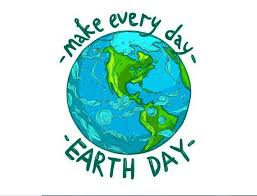
April 22, 2020 marks 50 years of Earth Day.
- The theme for Earth Day 2020 is climate action.
- It was first celebrated in 1970. On April 22, 1970, millions of people took to the streets to protest the negative impacts of 150 years of industrial development.
- Objective: To increase awareness among common public, especially among youngsters, to get the full effect of the campaign of environmental safety.
- Organization: Earth Day Network (EDN) is the not for profit organization that leads Earth Day worldwide.
2.Oil Pricing:

Recently, the prices of West Texas Intermediate (WTI), the best quality of crude oil in the world, fell to minus $40.32 a barrel in interlay trade in New York (the USA).
- It means that the seller of crude oil would be paying the buyer $40 for each barrel that is bought.
- It is the lowest crude oil price ever recorded below the zero marks while the previous lowest was recorded immediately after World War II (WWII).
Oil Pricing:
- Generally, the Organization of the Petroleum Exporting Countries (OPEC) used to work as a cartel and fix prices in a favorable band.
- OPEC is led by Saudi Arabia, which is the largest exporter of crude oil in the world (single-handedly exporting 10% of the global demand).
- It could bring down prices by increasing oil production and raise prices by cutting production.
- The global oil pricing mainly depends upon the partnership between the global oil exporters instead of the well-functioning competition.
- Cutting oil production or completely shutting down an oil well is a difficult decision because restarting it is immensely costly and complicated.
- Moreover, if a country cuts production, it risks losing market share if other countries do not follow the suit.
- Recently, OPEC has been working with Russia, as OPEC+ to fix the global prices and supply.
3.World Press Freedom Index 2020:
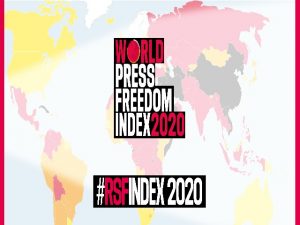
The World Press Freedom Index 2020 has been released by the media watchdog group Reporters Without Borders.
- Norway ranks first for the fourth consecutive year and Finland and Denmark in second and third place.
Impact of Coronavirus pandemic:
- The coronavirus pandemic may threaten press freedom and worsen the crises that reporters around the world are facing.
- The pandemic has already redefined norms. The pandemic has allowed governments to take advantage of the fact that politics are on hold, the public is stunned and protests are out of the question, in order to impose measures that would be impossible in normal times.
- The United States and Brazil were becoming models of hostility toward the news media.
- China, Iran, and Iraq are criticized for censoring coverage of the coronavirus outbreak.
India’s performance:
- India has dropped two places to be ranked 142nd.
- With no murders of journalists in India in 2019, as against six in 2018, the security situation for the country’s media might seem, on the face of it, to have improved.
About the World Press Freedom Index:
- Published annually by Reporters Without Borders since 2002, the World Press Freedom Index measures the level of media freedom in 180 countries.
- It is based on an evaluation of media freedom that measures pluralism, media independence, the quality of the legal framework, and the safety of journalists.
4. Unlawful Activities (Prevention) Act:
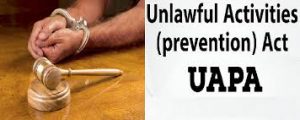
Recently, many activists, journalists, and students have been booked under the Unlawful Activities (Prevention) Act (UAPA) in different cases across the country.
- UAPA was passed in 1967. It aims at effective prevention of unlawful activities associations in India.
- Unlawful activity refers to any action taken by an individual or association intended to disrupt the territorial integrity and sovereignty of India.
- The Act assigns absolute power to the central government, by way of which if the Centre deems an activity as unlawful then it may, by way of an Official Gazette, declare it so.
- It has the death penalty and life imprisonment as the highest punishments.
- Under UAPA, both Indian and foreign nationals can be charged. It will be applicable to the offenders in the same manner, even if a crime is committed on foreign land, outside India.
- Under the UAPA, the investigating agency can file a charge sheet in a maximum of 180 days after the arrests, and the duration can be extended further after intimating the court.
- The 2004 amendment, added “terrorist act” to the list of offenses to ban organizations for terrorist activities, under which 34 outfits were banned.
- Till 2004, “unlawful” activities referred to actions related to secession and cession of territory.
- In August, Parliament cleared the Unlawful Activities (Prevention), Amendment Bill, 2019 to designate individuals as terrorists on certain grounds provided in the Act.
- The Act empowers the Director-General of National Investigation Agency (NIA) to grant approval of seizure or attachment of property when the case is investigated by the said agency.
- The Act empowers the officers of the NIA, of the rank of Inspector or above, to investigate cases of terrorism in addition to those conducted by the DSP or ACP or above rank officer in the state.
5.Sujalam Sufalam Jal Sanchay Abhiyan:
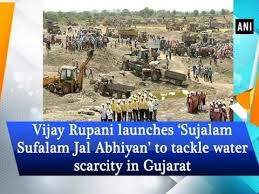
Amid the lockdown for the coronavirus outbreak, the Gujarat government has given its the green signal for the third edition ”Sujalam Sufalam Jal Sanchay Abhiyan’‘, a conservation plan to deepen water bodies in the state before the monsoon.
- The scheme, which will continue till June 10, will see the deepening of lakes, check dams, and rivers by removing silt, and it will be done with people”s participation as well as under MNREGA.
- The scheme was started in 2018 after a weak monsoon, and to date, the state”s water storage capacity has increased by 23,000 lakh cubic feet due to deepening pf lakes, check-dams, rivers, and reservoirs.
Sujalam Sufalam Jal Sanchay Abhiyan:
- Launched in 2018, the scheme aims to deepen water bodies in the state to increase the storage of rainwater to be used during times of scarcity.
- It involves cleaning and desilting of riverfronts, sprucing up of Irrigation canals. It also involves the deepening lakes, tanks, and reservoirs.
- The drive runs on a Public-Private Partnership model and contribution from the government shall remain 60% of the expenditure of the work while 40% share will be from people’s contribution.
6.Global Annual Report released by the United Nations World Food Programme:
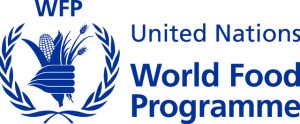
The World Food Programme of the United Nations recently released its fourth annual report on Food Crisis. According to the report, the food crisis has grown by 10%.
- The report says that around 265 million people are facing food insecurity in 2020.
- This has increased as compared to 2019. In 2019, around 135 million were affected.
- The report has found that around 135 million people from 55 countries are living in an acute food crisis.
- The increase in the food crisis is mainly due to economic shocks, conflicts, and weather-related events such as drought.
- The financial flows of humanitarian assistance in 32 of the 53 countries with the food crisis have increased. However, the increase is not on par with the increase in the food crisis. In 2016, the financial flows were 5.38 billion USD and in 2018, the financial flows were 6.5 billion USD.
7.Zoonoses:
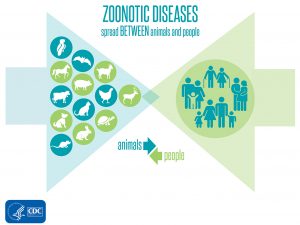
According to the UN Environment Programme (UNEP), 60% of human infectious diseases originate from animals.
Zoonoses: It is the name given to diseases transmitted from animals to humans.
- It is based on the Greek words for “animal” and “sickness”.
- Examples: Tuberculosis (cattle), rabies (rabid dogs), Ebola (fruit bats), West Nile virus (infected mosquitoes), the
- Zika virus (infected Aedes species mosquito)–and the most recent – the novel coronavirus Covid-19 (bat/pangolin).
Data Related to Zoonoses
- On average, one new infectious disease emerges in humans every four months.
- A study by American researchers that was completed before the new coronavirus outbreak identifies rodents, primates, and bats as hosts of three-quarters of viruses transmitted to humans.
- Domestic animals also carry about 50% of the zoonoses identified.
- In 2016, the UNEP pointed out that 75% of all emerging infectious diseases (such as Ebola, HIV, avian flu, Zika, or SARS) in humans are zoonotic (pertaining to zoonoses).
- According to it, these zoonotic diseases are closely interlinked with the health of ecosystems.
- Deaths due to Zoonoses: Beyond the current outbreak of coronavirus, the Intergovernmental Science
- Policy Platform on Biodiversity and Ecosystem Services (IPBES) estimates that zoonoses kill some 700,000 people a year.
Other important current affairs:
1. A UK High Court has dismissed fugitive liquor baron Vijay Mallya’s appeal against extradition to India.
- Mallya and his firm – Kingfisher Airlines Ltd, have come under the scanner of the Enforcement Directorate (ED), Central Bureau of Investigation (CBI), Serious Fraud Investigation Office (SFIO) and the Securities and Exchange Board of India (Sebi) for loan defaults of over Rs 10,000 crore to a consortium of Indian banks led by the State Bank of India (SBI).
- While Mallya is facing charges of cheating, criminal conspiracy, money laundering, and diversion of loan funds, a few of his companies including Kingfisher Airlines are facing charges of violations of the Companies Act 2013 and Sebi norms. Mallya, has denied any wrongdoing.
2. Union Health Minister has launched an interactive platform, COVID INDIA SEVA aimed at providing real-time solutions to Covid-19 related queries.
- People can post their queries to the COVID INDIA SEVA twitter handle for getting swift replies from the team of trained experts.
- This initiative is aimed at enabling transparent e-governance delivery at large scales especially in crisis situations like the ongoing COVID-19 pandemic.
- Through this platform, trained experts will be able to share authoritative public health information swiftly at scale, helping to build a direct channel for communication with citizens.
5. A mobile application named Saiyam has been developed by the Pune Municipal Corporation under Smart Cities Mission to effectively track the home-quarantined citizens and ensure that they are staying in the home.
- The Mobile Application has GPS tracking so that whenever quarantined citizens leave their homes, City Administration gets alerted and the local ward or the local police station gets informed, who then visit the family.
- Citizens’ movements can be monitored centrally in real-time from the monitoring cell and are marked as Red, Amber, or Green.
- Red signifies that the person has ventured out for longer duration; Yellow signifies that the person has limited movements and Green signifies that the person is confined to house limits.
6.US President Donald Trump appointed Indian-American Sudarsanam Babu to country’s top science board.
- Babu, who is from the prestigious Oak Ridge National Laboratory (ORNL), has been appointed as a member of the National Science Board for a six-year term, said the White House.
- Babu would be the third Indian American on this prestigious board. The other two being Sethuraman Panchanathan from the Arizona State University and Suresh V Garimella from the University of Vermont.
7. The Council of Scientific and Industrial Research (CSIR) has decided to test its new drug against Sepsis, named Sepsivac to treat critical patients of Covid-19.
- The drug will be tested in 50 Covid-19 patients at the All-India Institute of Medical Sciences in Delhi and Bhopal, and Post Graduate Institute of Medical Education and Research, Chandigarh.
- The new drug has recently been approved for marketing in India and would be available commercially as Sepsivac from Ahmedabad-based Cadila Pharmaceuticals Limited.
- The pharmaceutical company was supported by CSIR laboratories led by the Indian Institute of Integrative Medicine (IIIM), Jammu in the development of this drug, which has also been found effective for leprosy patients.
8. Recently, the Union Health Minister urged the use of the e-Raktkosh portal as a single point for maintaining real-time information on the status of stocks of each blood group.
- The Health Minister has termed the availability of blood in blood banks as ‘essential’.
- In several blood disorders like thalassemia and hemophilia regular transfusion of the blood is necessary.
- the e-Raktkosh portal is a Centralized Blood Bank Management System.
- It is a comprehensive IT solution to standardize and streamline the standard operating procedures, guidelines, and workflow of blood banks across the nation.
- It was inaugurated on 7th April 2016 by then Minister of Health and Family Welfare (MoHWFW)
- It enforces the Drug & Cosmetic Act, National blood policy standards, and guidelines ensuring proper management of blood.
9. Daporijo Bridge:
- The Border Roads Organisation (BRO) has constructed the Daporijo bridge over the Subansiri River in Arunachal Pradesh in a record span of just 27 days.
- The bridge links roads leading up to the Line of Actual Control (LAC) between India and China.
- The Subansiri River is a tributary of the Brahmaputra River in the Indian states of Assam and Arunachal Pradesh, and the Tibet Autonomous Region of China.
- The Subansiri is the largest tributary of the Brahmaputra.
11. World Book Day:
- Also known as World Book and Copyright Day, or International Day of the Book, it is an annual event organized by the United Nations Educational, Scientific and Cultural Organization (UNESCO) to promote reading, publishing, and copyright.
- World Book Day was first celebrated on 23 April 1995.
- On April 23, UNESCO will celebrate the 25th edition of World Book and Copyright Day.
12. CIVIL SERVICES DAY:
- Observed on 21st April every year.
- On this day in 1947, Sardar Vallabhbhai Patel addressed the first batch of probationers at the All India Administrative Service Training School at Metcalfe House, New Delhi in 1947.
- In his speech he called civil servants as the steel frame of India.
- Objective: To make civil servants re-dedicate themselves to the cause of the citizens and renew their commitment to public service.
- On this day, the ‘Prime Minister Award for Excellence in Public Administration’ is given. The award is given in three categories, dividing the states and UTs into different categories. The award was instituted in 2006.
13.About the Technology Development Board:
- It is a statutory body established by the Technology Development Board Act, 1995.
- Objective: To promote the development and commercialization of indigenous technology and adaptation of imported technology for much wider application.
14. The Grand Mufti of Dubai has declared that this year Zakat can be paid to those affected by Covid-19 or any disadvantaged person in the form of food or meals.
- Zakat or almsgiving to the poor and needy is one of the five important pillars of Islam.
15. The Indian Council of Medical Research directed the states to stop using rapid test kits for 2 days. The order comes after several states started complaining about faulty kits.
- The GoI had received around 3 lakh COVID-19 rapid testing kits from China.
- The plan is to import around 6,50,000 kits from China.
- However, the states have been complaining that the kits are producing faulty results.
- Hence, the Government of India has ordered to stop using COVID-19 rapid antibody test kits.
- The kits were showing variations ranging between 6% and 71%
16. The Government of India brought in an ordinance to end violence against doctors and health care workers.
- According to the ordinance, persons attacking health personnel are to be sentenced to jail for 6 months to 7 years.
- In non-serious cases, the workers are liable to pay a penalty of Rs 50,000 and in serious cases between Rs 2 lakhs and 5 lakhs.
- In order to achieve this, the ordinance will make an amendment to the Epidemic Disease Act, 1897. Also, the GoI has made the Epidemic Act a concurrent act.
- This allows the state governments to take action as well.
- The Protest: The Indian Medical Association had declared April 23, 2020, as black day to protest against attacks on health care professionals, workers, staff, and doctors all over the country.
- It demanded the central government to punish those causing violence.
- However, the protest was withdrawn by the association after the cabinet approved an ordinance to take strict actions against persons causing the violence.




